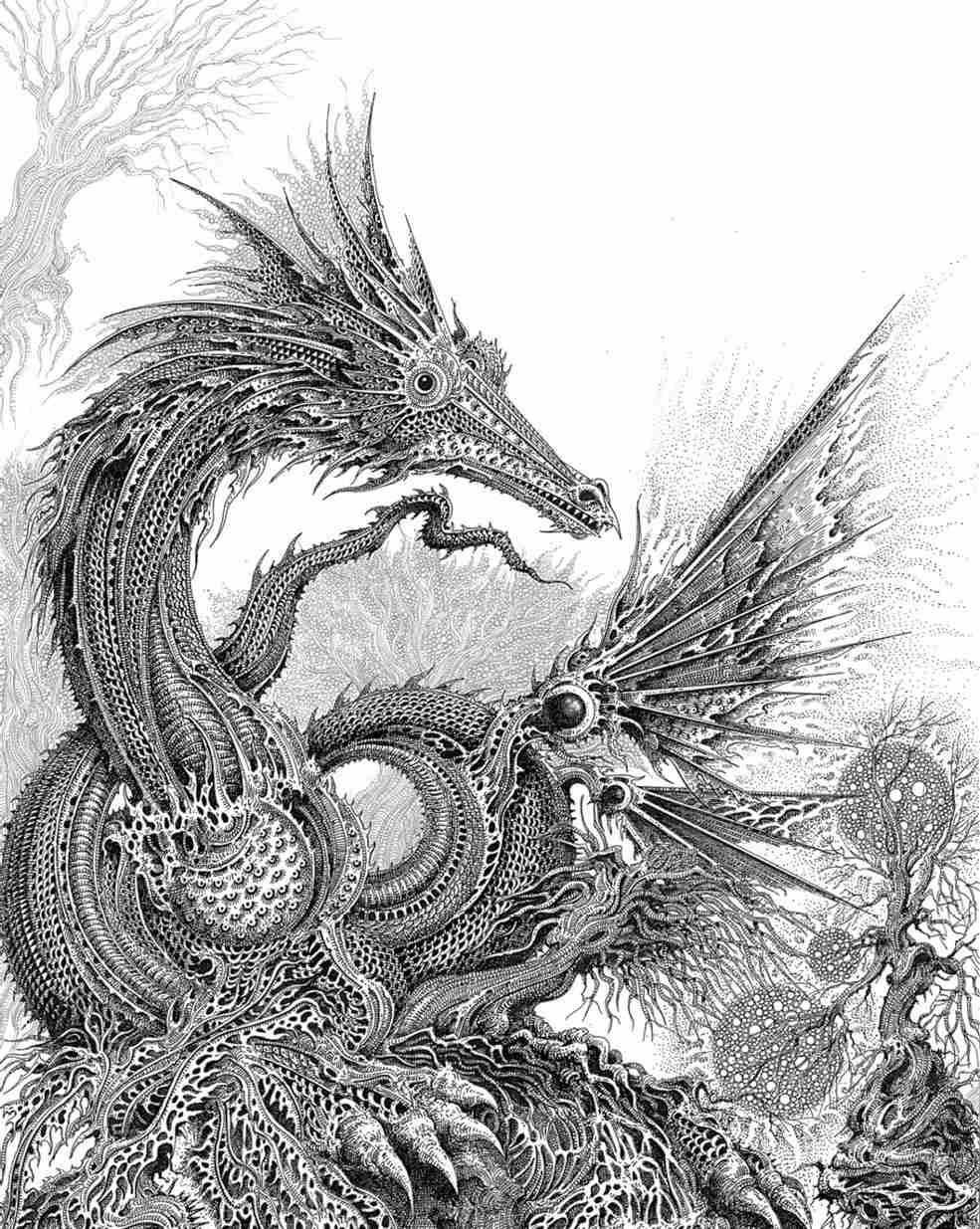THE RHINEGOLD

SCENE ONE
In the limpid green depths of a river, the three water nymphs – the Rhinemaidens – play and sing. These are the beautiful daughters of the River Rhine, who are spied on by Alberich the Nibelung. The ugly dwarf has made his way down into their watery realm, where he lustfully and fruitlessly pursues the teasing nymphs. Enraged by their mocking, the dwarf is suddenly overcome by a brilliant golden glow. Rays of sunlight catch on a gold pinnacle of rock, which fills the murky river with shimmering gold light. The nymphs sing praises to this treasure, the Rhinegold, which is a stone that, if forged into a gold ring, would allow its master to become lord of the world.
However, the Rhinegold can be taken and mastered only by one who is willing to curse love and renounce all love’s pleasures. Since Alberich is too ugly to win love anyway, he will take power: he swears an oath renouncing love. The Nibelung then snatches the Rhinegold from the pinnacle and flees into the dark.
SCENE TWO
Dawn comes to a mountain height above the Rhine Valley where Wotan, the king of the gods, and his queen, Fricka, sleep. In the distance stands a magnificent castle with gleaming battlements, up on an impossibly high peak. Fricka wakes Wotan, and the god is filled with delight at the sight of the newly completed kingdom of the gods. This was a realm built by the brute force of giants, but conceived in Wotan’s dreams.
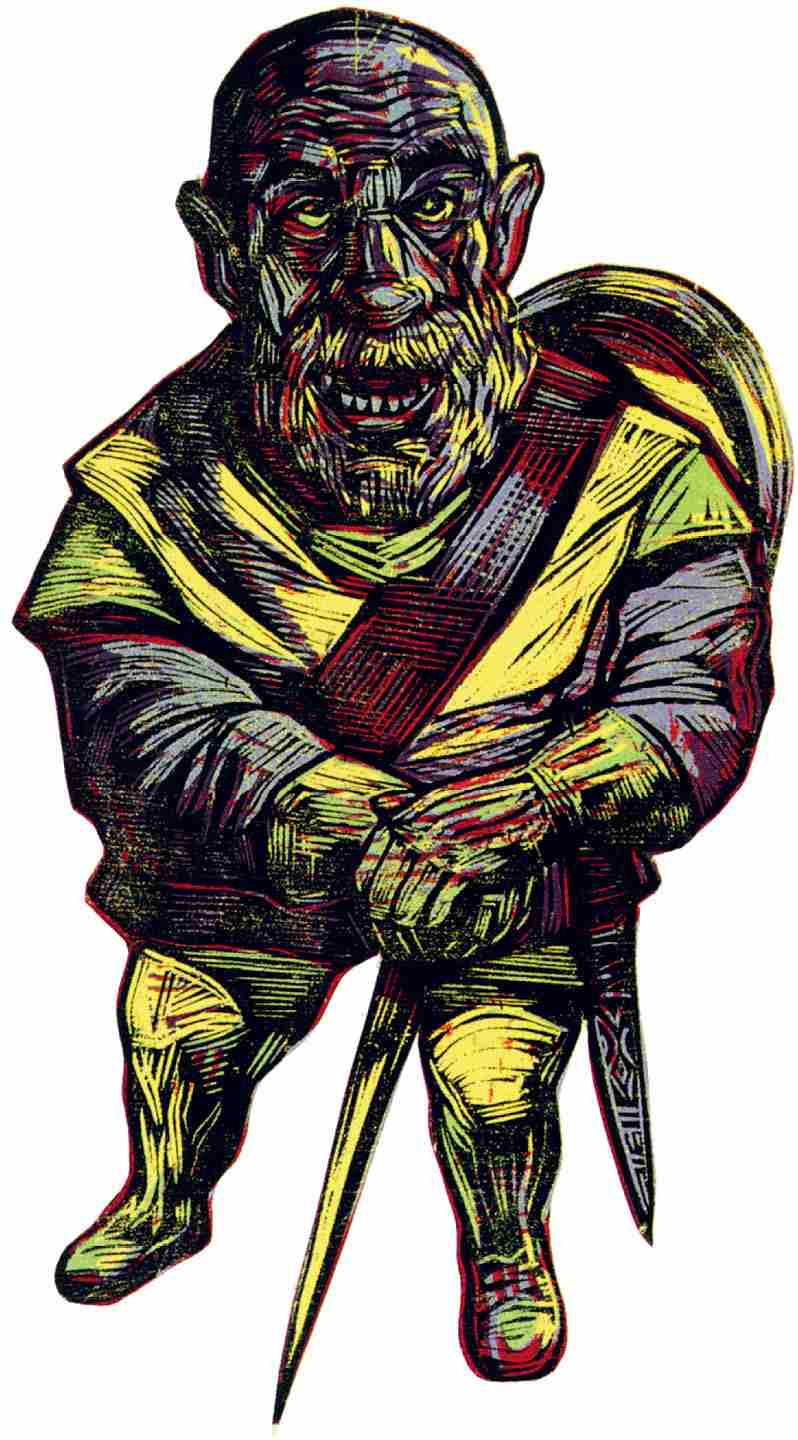
Unfortunately, the price promised to the giants Fasolt and Fafner for building this kingdom is the hand of Fricka’s sister, Freia, the goddess of youth. However, with Freia the gods will also lose the golden apples of immortality of which she is guardian, and, without this fruit, they will soon grow old and die.
When the giants come for their payment, Donner, the god of thunder, Froh, the god of spring, and Loge, the trickster god of fire, come to side with Wotan to defend Freia. But the bargain cannot be broken as Wotan has sworn to make payment upon his sacred spear of law. It is up to Loge to come up with an alternative payment. The giants agree: they will have the ring of the Nibelung which Alberich has forged from the stolen Rhinegold, along with all the golden treasures he has amassed through its power. Loge also reveals that, if the ring is not soon taken from Alberich, he will rule over all of them anyway. The giants take Freia as a hostage, as Wotan and Loge descend into the bowels of the earth in search of the realm of Alberich the Nibelung.
SCENE THREE
The subterranean caverns of Nibelheim, the home of the Nibelung dwarfs, are a vast stone labyrinth of tunnels and chambers. This is a dark and sinister world lit only by the red glow of furnace and forge. Here, Alberich the ring lord torments his enslaved brother Mime, who has just completed the forging of the magic helmet called Tarnhelm on Alberich’s orders. Tarnhelm has the power to make the wearer invisible or change him into whatever form he wishes. It can also transport him to any place he wishes. Alberich places the Tarnhelm on his head and immediately vanishes. The invisible Alberich then cruelly kicks and beats Mime until he cries out for mercy. Delighted with his new toy, Alberich goes off to terrorize his other enslaved dwarfs.
Mime continues to bewail his enslavement, as the gods Wotan and Loge enter the cavern. Alberich soon returns, driving his treasure-bearing dwarfs before him. They pile up a huge hoard of purest gold. Alberich contemptuously greets his guests and arrogantly reveals how he will build up such vast wealth and power that he will eventually overthrow the gods and rule the world.
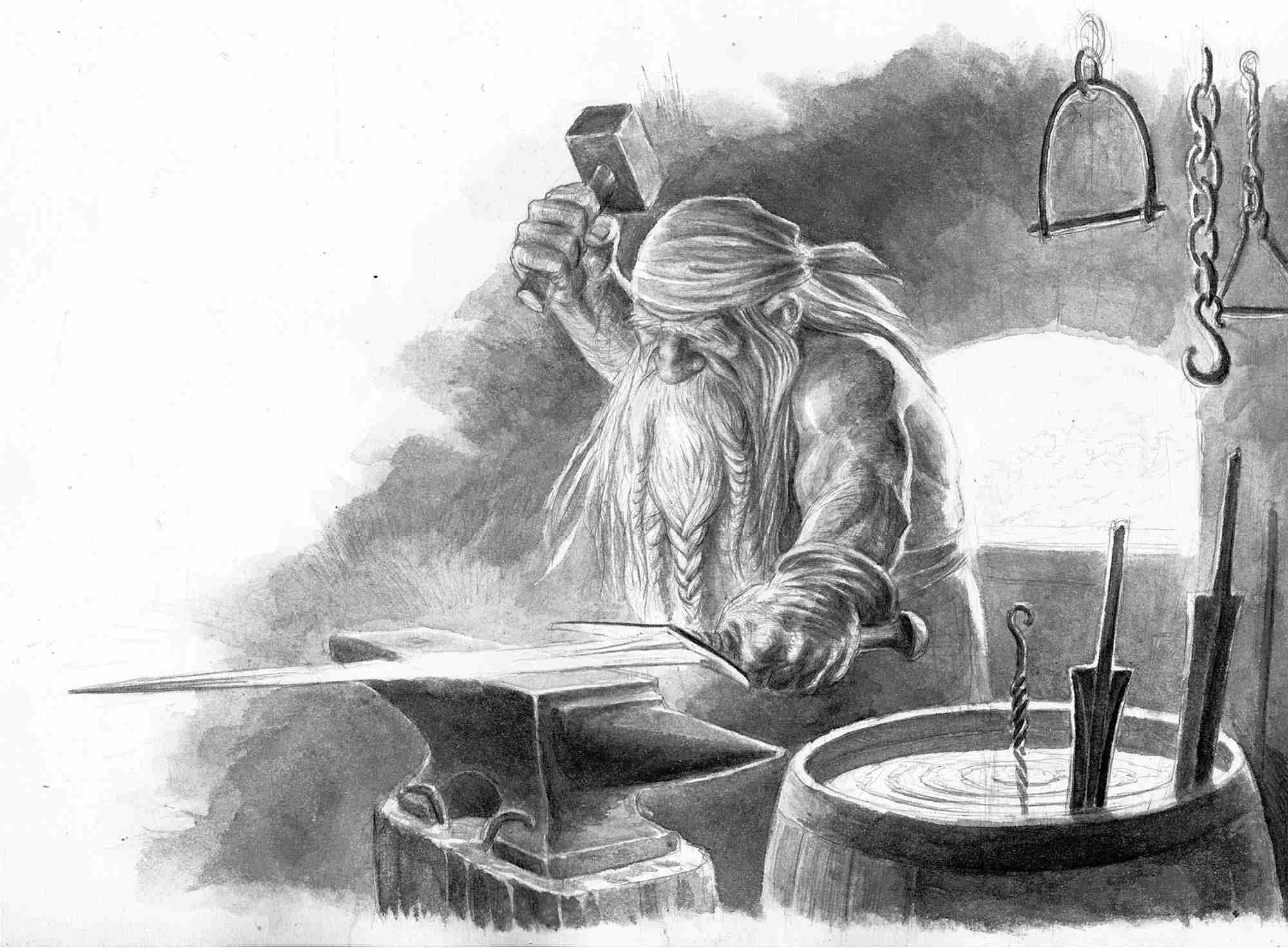
Wotan can barely contain his anger, but crafty Loge flatters the dwarf and asks him about the powers of Tarnhelm. “Can it really transform him into any shape?” he asks. “Certainly,” Alberich replies, and immediately becomes a huge dragon. Loge feigns fear and astonishment, but then suggests that it would surely be more impressive if the dwarf could become something really small, like a toad. Alberich foolishly obliges and transforms himself into a tiny toad. Wotan immediately seizes the tiny toad, while Loge snatches up Tarnhelm. When Alberich resumes his usual shape, he is bound and dragged off as a captive.
SCENE FOUR
The bound Alberich is taken to the misty mountain height above the Rhine where the bargain with the giants was struck. In order to win his freedom, Alberich is forced to give up his hoard of gold, Tarnhelm, and his magic ring. The enraged dwarf refuses, but finally everything is taken from him. Once the humiliated Alberich is released, he wrathfully places a curse of disaster and death on anyone who commands the ring. Soon after, all the gods gather with the giants, Fasolt and Fafner, and their hostage Freia. Fasolt is in love with Freia, but agrees to accept gold only if it completely hides her from his sight. The gods pile all the gold around her, but Fasolt can still see the sheen of her hair, so Loge gives up Tarnhelm to cover it. She seems entirely covered, but Fasolt cries out that he can still see the star-like glint of her eye. The giants demand the ring to seal the crack, but Wotan is enthralled by the ring’s power and will not give it up. Loge meanwhile tries to claim it for its rightful owners, the Rhinemaidens.
In the midst of the quarrel, the earth splits open and Erda, goddess of the earth, arises out of the ground. She is the spirit of the world and the prophet of the gods. She commands Wotan to surrender the ring or the gods and all their realm will be doomed. Almost immediately the curse of the ring strikes when the giants quarrel over its possession. Fafner brutally murders Fasolt and takes both the ring and the treasure. After Fafner’s departure, Donner, god of thunder, walks into the mountain mists, where the thunder of his hammer is heard and flashes of lightning are seen as he forges a rainbow bridge. It arches through the air and leads up to the great castle of the gods, which Wotan now names Valhalla. Wotan leads the godly procession over the Rainbow Bridge to Valhalla, while far below the Rhinemaidens cry out for the loss of their gold.
THE VALKYRIE

ACT ONE
SCENE ONE
A storm is raging, and the hero Siegmund the Walsung enters the great hall of the warrior-chieftain Hunding. In the middle of the dwelling is the trunk of a huge ash tree whose limbs support the roof. He is wounded and exhausted from pursuit by enemies through the forest. He collapses on a bearskin before the fire in the enormous stone hearth. Hunding’s wife, Sieglinde, enters the house and, seeing the now unconscious Siegmund, takes pity on him and revives him. Instantly, there is a powerful attraction between the two.
SCENE TWO
Hunding arrives home and reluctantly offers shelter and food to Siegmund. When he asks Siegmund his name, the youth gives his outlaw name, Wehwalt the Wolfing. His name means “Woeful”: his father, Wolfe, his mother and his twin sister were all slain or lost to him. As he describes his latest disasters, it is soon revealed that his enemies are Hunding’s kinsmen. Hunding tells his guest he is safe for the night, but in the morning he must find a weapon and they will duel to the death.
SCENE THREE
Alone in the great hall, Siegmund is soon joined by Sieglinde, who has given Hunding a sleeping-potion. Sieglinde tells Siegmund how she had been orphaned as a child, and as a captive was given as a reluctant bride to Hunding. But to the wedding came a stranger: an old man dressed all in grey with a slouch hat and a single glittering eye. That old man brought a bright sword and drove it into the mighty ash tree that holds up the roof of Hunding’s house. Many heroes since that time have tried to draw it out, but none could do it. When Sieglinde confesses her unhappiness, Siegmund swears his love for her and promises to free her from her forced marriage. As Sieglinde swears her love in return, they tell one another more about their past lives. When the hero reveals that his father’s real name was Walse, Sieglinde suddenly realizes that he is her long-lost twin brother, and their passion for one another is redoubled. Siegmund draws the gleaming sword from the great ash tree as the two lovers rejoice in this union of Walsung blood. They then rush out into the night.
ACT TWO
SCENE ONE
In a craggy mountainous wilderness, the mighty Wotan talks to his Valkyrie daughter Brunnhilde and tells her she must go into battle and give a just victory to his mortal son, Siegmund the Walsung, over Hunding. Joyfully, she obeys him and departs, just as Wotan’s queen Fricka arrives upon a chariot drawn by two rams in the wake of a storm. Queen Fricka, who is also the goddess of marriage, insists that Hunding’s sacred marriage rights must be defended and the Walsungs punished for adultery and incest. Wotan is forced against his will to enforce the law, for his power will leave him if he does not. Wotan swears an oath to command the death of Siegmund the Walsung. Queen Fricka victoriously rides off in her chariot.
SCENE TWO
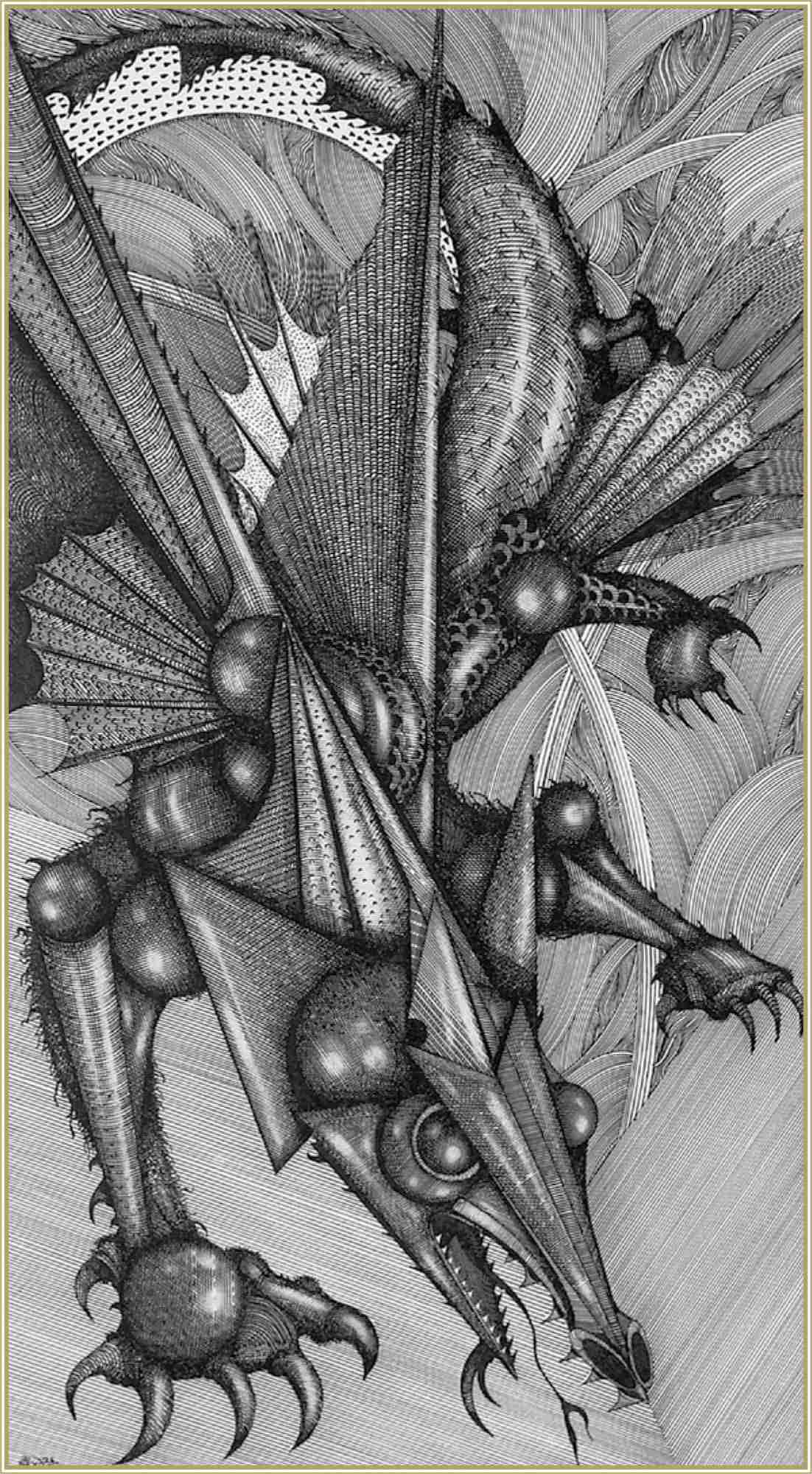
Fafner the Dragon
Angered and saddened, Wotan now tells the Valkyrie Brunnhilde how Valhalla was bought with the ring, and how the ring was doubly cursed by dwarfs and Rhinemaidens. To prevent disaster, Wotan went to the goddess Erda, with whom he conceived the nine Valkyries, who would gather in Valhalla a vast army of heroes to help defend the gods in their hour of need. Yet the fate of the world is dependent on Alberich’s ring, for the dwarf of Nibelheim still plots continually to seize the ring from the giant Fafner, who broods over his golden treasure and guards it night and day. If the Nibelung eventually seizes the ring, the fate of the gods will be sealed. For by its power, Alberich will turn Wotan’s heroic army against him and overthrow the gods. As Wotan is forbidden the ring, and only Alberich who has cursed love can command its power, the only hope for the gods is to be found in a mortal hero who is brave and strong enough to slay the giant and seize the ring on their behalf. To this end, the mortal hero Siegmund the Walsung was conceived and given a godly sword called Notung. But the curse of the ring is at work, for the laws of Fricka dictate that Wotan must order Brunnhilde to slay Siegmund.
SCENE THREE
The Valkyrie Brunnhilde sees Siegmund and Sieglinde approaching a rocky gorge and slips away. Siegmund comforts his sister-bride, who hears the hunting-horn of Hunding in pursuit and tells Siegmund to leave her and flee. Siegmund will not and swears to protect her with his sword, Notung, and tenderly comforts her until she falls into an exhausted sleep.
SCENE FOUR
Brunnhilde appears as if in a vision to Siegmund, leading her horse. Only warriors condemned to die can see the Valkyries, and Brunnhilde tells Siegmund that she will take him to Valhalla. Siegmund says he will not leave his sister-bride for the warriors’ heaven. The Valkyrie tells him he has no choice, but Siegmund says he will make sure they are together in death. He takes out his sword with the intention of slaying both Sieglinde and himself. The Valkyrie stays his hand and swears she will violate the will of Wotan and give victory to Siegmund the Walsung.
SCENE FIVE
Siegmund leaves the sleeping Sieglinde and goes in search of Hunding. As the storm clouds flash and roar, the battle between the heroes commences upon a distant mountain ridge. Sieglinde wakes and is tormented by the sight of the conflict. Siegmund is protected by the Valkyrie’s shield, and Hunding is driven back. But just as Brunnhilde guides Siegmund’s sword in what would certainly be a fatal blow, the storm clouds part and throb with fiery light. The fierce Wotan appears; he stands over Hunding and blocks Siegmund’s stroke with the shaft of his spear. Siegmund’s sword shatters and Hunding immediately plunges his own spear into the unarmed Siegmund’s breast. Brunnhilde, seeing the hero lost, swiftly lifts Sieglinde onto her steed and rides away. Wotan remains sadly looking over the body of his mortal son Siegmund. Hunding pulls his spear from Siegmund’s body, but stands too near the god. With a contemptuous wave of his hand, Wotan strikes Hunding dead then vanishes in a flash of lightning.
ACT THREE
SCENE ONE
On the craggy heights of the Valkyrie Rock, the Valkyries arrive one by one with dead warriors across their saddles. The eight shield maidens gather to await Brunnhilde before they ride off to Valhalla. They are astonished when they see the rebel Valkyrie arrive with a living maiden across her saddle. They are filled with fear when they are told what has occurred. Sieglinde despairs and does not wish to live until Brunnhilde tells her that she is carrying Siegmund’s child. For this she is thankful and determined to live. She takes the shards of the hero’s sword from the Valkyrie, who also tells her that her son’s name is to be Siegfried – victorious and free. Sieglinde is told to escape into the pine forest below the rock because Wotan avoids this place. In it lives the evil giant Fafner, who, after long years of brooding over his treasure and his ring, has become a great dragon. Sieglinde flees, while Brunnhilde bravely awaits Wotan’s wrath.
SCENE TWO
Wotan appears before the Valkyries in a flash of fiery red light. In his fury he condemns Brunnhilde: she will lose all her supernatural powers and become a mortal man’s wife. The other Valkyries are filled with horror at their sister’s fate and beg Wotan to have pity on her. Wotan silences them and drives them away by threatening them with the same fate.
SCENE THREE
Wotan and Brunnhilde remain alone on the rock. She claims that in defying his command she was actually doing his will and protecting his favourite mortal children, the Walsungs. But Wotan cannot take back his judgment. He tells her that he will cast a spell of sleep on her. She will be left upon this rock for any mortal man to find, and when she is awakened she will be his prize. Wotan sadly and tenderly kisses Brunnhilde’s eyes, and she falls into an enchanted sleep. Wotan lays her gently upon the ground, closes the visor of her helmet over her face and places her Valkyrie shield over her breast. Invoking Loge’s fire, Wotan encircles the rock where the sleeping beauty lies with a wall of flame. Striking the rock as he departs, Wotan invokes a spell forbidding the rock to anyone who fears his spear.
SIEGFRIED

ACT ONE
SCENE ONE
A large cave on the edge of a deep wood serves as a smithy for that ill-humoured dwarf Mime, the brother of Alberich. Mime toils at the forge, complaining about his ungrateful foster son, Siegfried. The greedy dwarf has no love for the powerful youth, but his plan is to get Siegfried to slay the dragon Fafner who lives nearby and so win the ring and treasure for Mime. The problem is that Mime doesn’t have the skill to re-forge the sword Notung, and all the swords he makes are not strong enough for the youth. Dressed in skins, the young Siegfried enters the smithy leading a huge bear on a rope, and jokingly has the bear chase the smith about the cave until he gives him his new sword. Once again, when Siegfried tries the blade, it breaks, and the youth scolds the dwarf. Siegfried wonders at his dislike of this dwarf who has nurtured him; something has always told him that Mime is evil. After threats from Siegfried, Mime finally tells the youth how his mother, Sieglinde, died in childbirth. Siegfried demands proof, so Mime shows him the fragments of the sword Notung. Siegfried rejoices and orders Mime to re-forge the sword.
SCENE TWO
An ancient one-eyed man in a dark blue cloak enters the smithy. He is weary from his travels and uses a spear as a staff and wears a large broad-brimmed hat. He is called the Wanderer but is actually Wotan in his earthly guise, and he asks the inhospitable Mime for shelter. The dwarf tries to turn the traveller from his door, but the Wanderer challenges him to a contest of riddles, which will result in the loser giving up his head. The Wanderer easily answers Mime’s three riddles – who lives under the earth (the dwarfs or black-elves of Nibelheim), on it (the giants of Riesenheim) and above it (the gods or light spirits of Valhalla)? In return, Mime answers two of the Wanderer’s riddles – name the family that Wotan loved best yet treated most harshly (the Wasungs), and name the sword of the Walsungs (Notung). However, when the Wanderer asks him to name the one who can re-forge Notung, Mime is beaten. The answer to the riddle is: only one who has never known fear can re-forge the sword. To that same man, the Wanderer says, as he departs, he will leave the forfeit of Mime’s head.
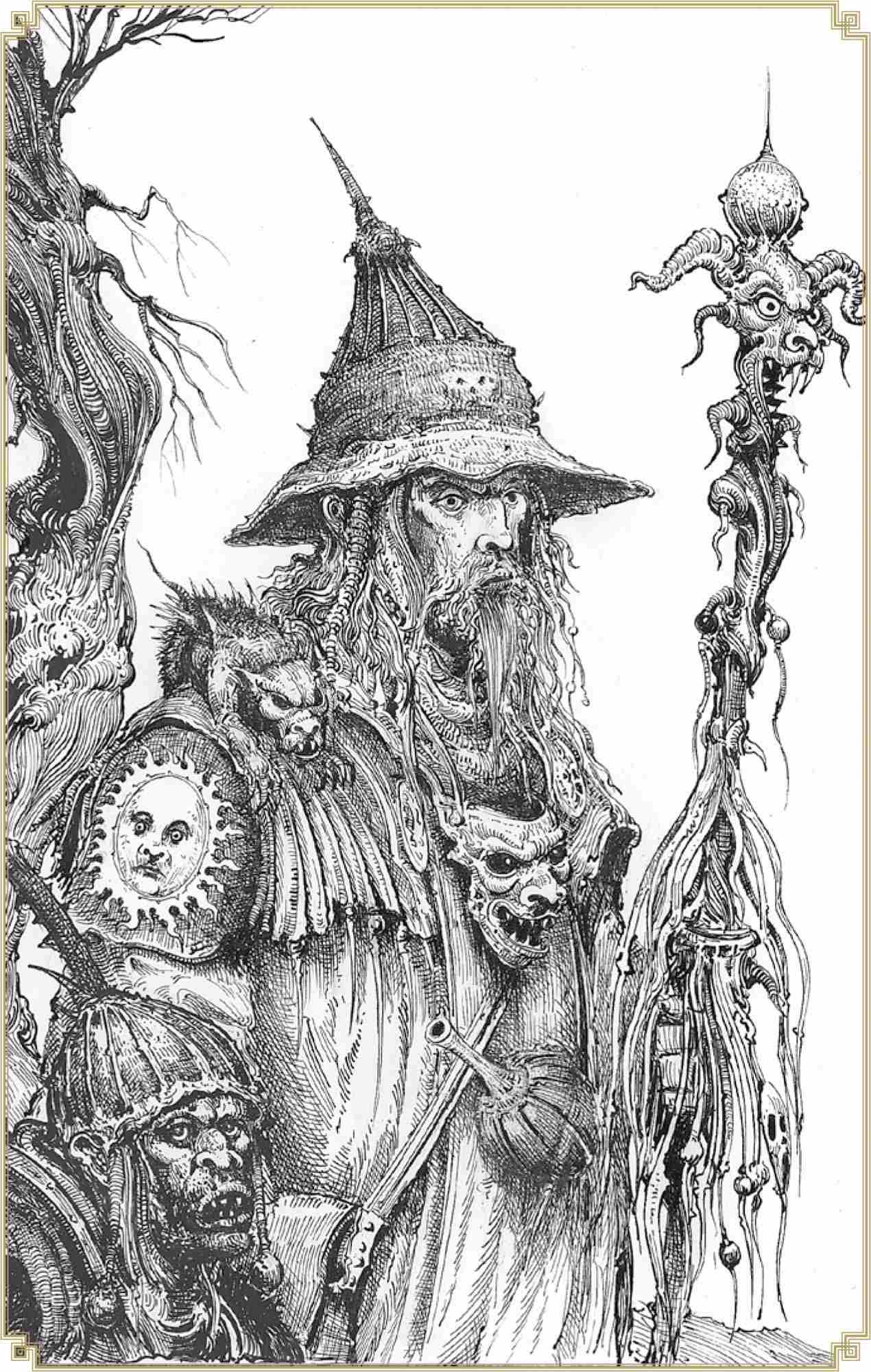
Wotan the Wanderer
SCENE THREE
Siegfried returns for his sword and finds it not yet made. Mime now understands that Siegfried is the “one who has never known fear” and desperately tries to teach him the “meaning of fear”. This proves impossible, so Mime suggests that they go to visit Fafner the dragon, so the youth might learn about fear. Siegfried is keen to learn this new sensation, but decides that he must re-forge his father’s sword himself as Mime cannot. With sheer barbaric energy and demon strength, Siegfried succeeds where Mime has failed. As he works at the forge, the dwarf cooks up a sleeping potion for the youth. He believes that the youth will now slay Fafner the dragon, so the only way Mime may win the ring and save his life is to drug the youth and slay him while he sleeps. At last, the frenzy at the forge comes to a halt. Siegfried holds up the brilliant re-forged blade of Notung. Then, with a single stroke, he splits the anvil in two.
ACT TWO
SCENE ONE
In the depths of a forest in the dark of night, Alberich the Nibelung watches Fafner’s cave and broods over the ring. Wotan the Wanderer greets him in the dark. Alberich immediately recognizes him, but the god assures the dwarf that he is not after the ring. He warns Alberich that his real rival is his brother Mime. The young Siegfried knows nothing of the dragon’s gold and the ring, and Wotan is banned from informing or helping him. Then the Wanderer calls out to wake the dragon. Both the Wanderer and Alberich offer to save Fafner’s life in exchange for the ring, but the dragon finds this a ridiculous offer. He fears no one and goes back to sleep. Wotan laughs as he departs, telling Alberich he woke the dragon only to show the dwarf how fate cannot be altered.
SCENE TWO
As day breaks, Siegfried and Mime climb to a knoll above the mouth of the dragon’s cave. Mime leaves Siegfried alone and the youth blows his horn and wakes the dragon. Surprised, but not alarmed by Fafner’s size, Siegfried jokes with the monster and then asks him if he might teach him fear. The dragon grows impatient with the cocky youth and a titanic struggle ensues. The battle ends when Siegfried pierces the monster’s heart. As Fafner dies, he warns the youth of the ring’s curse. He also tells the hero that, because of the ring, Siegfried will also soon die. Some of the dragon’s blood drips on Siegfried’s fingers and he puts them in his mouth. He finds, at once, that he can understand the language of birds. The Woodbird tells Siegfried about the dragon’s gold, the magic Tarnhelm and the ring, which are to be found within the monster’s cave.
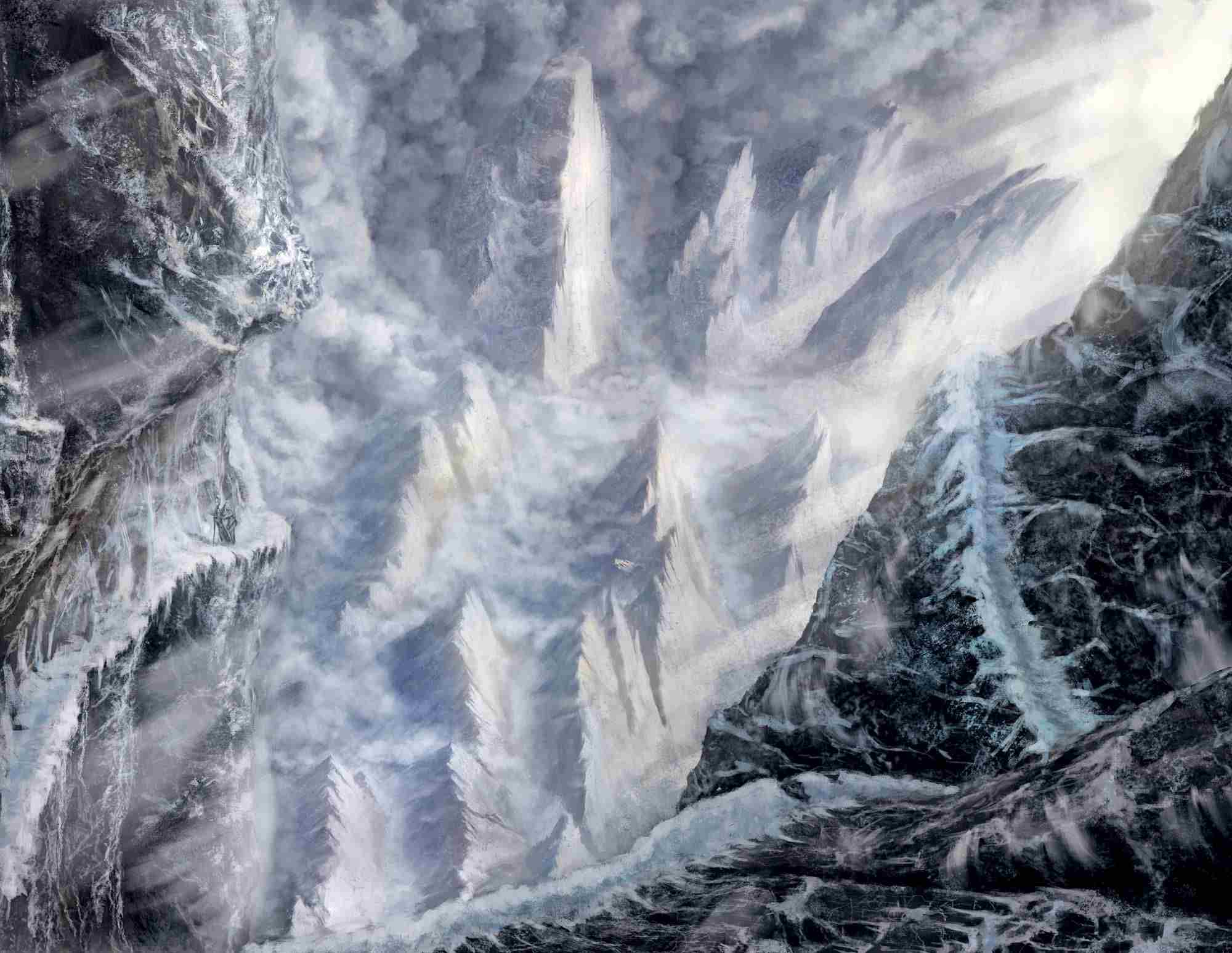
The mountain road to Valkyrie Rock
SCENE THREE

The dwarf brothers Alberich and Mime emerge from hiding. Seeing Fafner dead, they begin at once to argue over who will claim the treasure. Siegfried emerges from the dragon’s cave with the ring on his hand and Tarnhelm tied to his belt. The Woodbird now warns him about Mime’s plot. When Mime approaches and offers Siegfried a poisoned drink, the young hero cuts the dwarf’s head off, as Alberich laughs in the distance. Siegfried blocks the treasure-cave door with the body of the dragon. He then sets out on a new adventure when he is told by the Woodbird about a sleeping maiden who is to be found surrounded by a ring of fire on Valkyrie Rock.
ACT THREE
SCENE ONE
In a wild mountain pass, Wotan in his earthly guise as the Wanderer summons the prophetic goddess Erda and demands to learn the fate of the gods. When Erda will not give an answer, Wotan accepts that the doom of Valhalla is near. His remaining hope lies with the young hero Siegfried – who now holds the ring – and with Brunnhilde. He bequeaths the world to the Walsungs, and the race of mortal men.
SCENE TWO
In the midst of the god’s reverie, Siegfried approaches. The Wanderer detains him and blocks his path. With a single stroke of the re-forged Notung, Siegfried shatters Wotan’s spear shaft. Thunder and lightning flash at his deed, and the Wanderer vanishes. Siegfried goes on his way and is soon confronted by the wall of fire. He blows his horn and plunges fearlessly into the flames.
SCENE THREE
Siegfried emerges from the flames at Valkyrie Rock, where he finds the sleeping, armoured warrior. However, when he removes the armour, he discovers the maiden Brunnhilde and is overwhelmed by her beauty. For the first time, he claims to understand what fear is, but he controls his trembling and wakens the sleeping beauty with a kiss. Brunnhilde awakens to her lover. She soon realizes that, by surrendering to Siegfried, she will lose her immortality, but she does so joyfully.
THE TWILIGHT OF THE GODS

PROLOGUE
Flames light up the Valkyrie Rock where the three fatal sisters, the Norns, sing of the ancient days of Wotan’s great deeds, as they weave the golden cord of fate. They sing of the shattering of Wotan’s spear of law and how this released Loge the god of fire, whose flames will soon consume Valhalla. They attempt to learn when the end will come, but the cord snaps. They understand that their own end has come, and they flee in terror to the caverns of Erda. As dawn comes, Siegfried and his bride Brunnhilde emerge from their cave. Although she is afraid that she may lose her lover, Brunnhilde knows how a warrior’s heart yearns for adventure. She gives him her armour and her horse Grane to help in his quest. Siegfried swears his eternal love and gives Brunnhilde the ring as his constant pledge before he sets off into the Rhine valley.
ACT ONE
SCENE ONE
Gunther, the king of the Gibichungs, and his sister Gutrune sit enthroned in the vast hall of their castle on the Rhine. They are in council with their dark, brooding half-brother Hagen, who advises them how they may increase the Gibichung dynasty’s wealth and power. He tells them they both must soon marry: Gunther to the wise and beautiful Brunnhilde, and Gutrune to Siegfried the Dragonslayer, who possesses the treasure of the Nibelung gold. This can be achieved only by guile. They agree that, when the approaching hero comes, Gutrune will give him a magic potion that will make Siegfried forget Brunnhilde and fall in love with Gutrune.
SCENE TWO
Siegfried’s horn sounds from a river boat as he approaches the castle. Hagen and Gunther welcome him with friendship and honour, and Gutrune brings to him a horned cup filled with the magic potion. Though he toasts them in the name of his lover Brunnhilde, the moment after the drink leaves his lips he opens his eyes and heart to Gutrune. He swears his undying love for her and asks for her hand in marriage. Gunther agrees on the condition that Siegfried win for him the fair Brunnhilde, whose name now means nothing to the drugged Siegfried. Hagen advises Siegfried that they may achieve their aim with the Tarnhelm, by whose magic he may change his shape to that of Gunther. Gunther and Siegfried swear blood oaths of brotherhood and ride off on their adventure.
SCENE THREE
On the Valkyrie Rock, Brunnhilde calls out a greeting of welcome to a sister Valkyrie. But the Valkyrie brings news of disorder and degeneration in Valhalla since Wotan’s spear was shattered. Wotan has no authority to rule or act, and nothing will lift the curse of the ring except its return to its rightful guardians. But Brunnhilde angrily refuses to return the ring to the Rhinemaidens, and drives her sister away. The ring is the token of Siegfried’s love and nothing will make her part with it. After the Valkyrie’s departure, however, a strange man penetrates the flames of the wall of fire. It is Siegfried wearing Tarnhelm, which has changed him to Gunther’s form. As Gunther the Gibichung, he claims Brunnhilde as his bride because he has passed the test of the ring of fire. After he seizes the ring from her hand, Brunnhilde has no power to resist him. He carries her off into the cave as his bride, but resolves to lay his sword between them as they sleep, so as not to dishonour his blood-brother.
ACT TWO
SCENE ONE
In front of the Gibichung hall, on the bank of the Rhine, Hagen, armed with spear and shield, is leaning against a doorpost, asleep. It is dark, but in the moonlight Alberich the Nibelung appears to Hagen in a dream. It is revealed that Hagen is the son of Alberich from a loveless union with Gunther’s mother. Alberich makes his unhappy son swear that he will win back the Nibelung’s ring.
SCENE TWO
As dawn breaks, Hagen awakens and Siegfried joyfully returns and greets him and Gutrune with the news that he has won Brunnhilde for King Gunther. He tells how he remained faithful that night, and then how on the journey back Gunther came and took Siegfried’s place, while Siegfried used the power of Tarnhelm to reach the Gibichung castle ahead of them.
SCENE THREE
Hagen has summoned all the vassals of the kingdom to welcome King Gunther and his new queen. They offer up sacrifices to the altars of the gods and swear to uphold the new queen’s honour.
SCENE FOUR
When Gunther arrives to present his new bride, Brunnhilde sees Siegfried with the ring upon his hand. She realizes at once that Gunther treacherously won her by deception. She tells all that Siegfried the Walsung is her true husband. Siegfried swears upon the point of Hagen’s spear that he has never known this woman as a bride. Brunnhilde is inflamed with a sense of betrayal and swears that his oath is false and that his sword hung on the wall, not between them. Siegfried denies the charge and leaves with Gutrune, although the vassals clearly believe Brunnhilde’s story.
SCENE FIVE
Brunnhilde is devastated and bent on vengeance for her betrayal. She turns to Hagen, and tells him that Siegfried is protected from all weapons by a magic spell she wove. There is one way Siegfried may be slain, however; because she knew he would never flee from battle, the spell does not protect his back. So if Hagen drives his spear blade into Siegfried’s back, he will die. Brunnhilde’s taunts, and Hagen’s promises of wealth and power, eventually persuade Gunther to join in the conspiracy to murder, as Siegfried’s wedding procession passes by.
ACT THREE
SCENE ONE
In a woodland on the banks of the Rhine, the three Rhinemaidens lament their lost gold. When Siegfried, who is out hunting, appears, they plead that he give back the ring, but he refuses. They warn him that, if he does not return it to the Rhine, he will be slain this day.
SCENE TWO
When the rest of the hunting party arrives, Hagen and Gunther urge Siegfried to entertain them with tales of his childhood with Mime and his slaying of Fafner the Dragon. Finally, after giving him a drink to revive his memory, Hagen asks him to tell of the wooing of Brunnhilde. With a pretence of moral outrage, Hagen drives his spear into the hero’s back. Calling out his love for Brunnhilde with his last breath, Siegfried dies.
SCENE THREE
In front of the Gibichung hall in the moonlight, Gutrune is anxiously waiting as an evil dream wakes her in the night. Hagen comes to tell her that Siegfried has been killed by a wild boar. However, when his body is carried in, Gutrune will have none of it. She accuses Gunther of murder, but Gunther denies it and curses Hagen. Hagen defiantly admits the murder, but says it was justice. Then he claims the golden ring for himself. When Gunther disputes his right, Hagen slays him. Yet when he is about to seize the ring, the dead Siegfried’s hand rises threateningly against him. Hagen falls back in fear, as Brunnhilde commands all to stand back from the hero. She orders a funeral pyre to be made for Siegfried. She then takes the ring and places it on her own finger. Then Brunnhilde torches the pyre, calls on the Rhinemaidens to retrieve the gold from the ashes, then rides Grane into the flames. The Rhine overflows its banks as the Gibichung hall is also consumed in the flames. The Rhinemaidens rise with the river. They joyfully seize the ring, and vengefully drag the damned Hagen down to a watery grave. The flood subsides to leave only the burned ruin of the hall, but in the distance, in the heavens, Valhalla can be seen catching alight, and is finally entirely consumed by flames.

